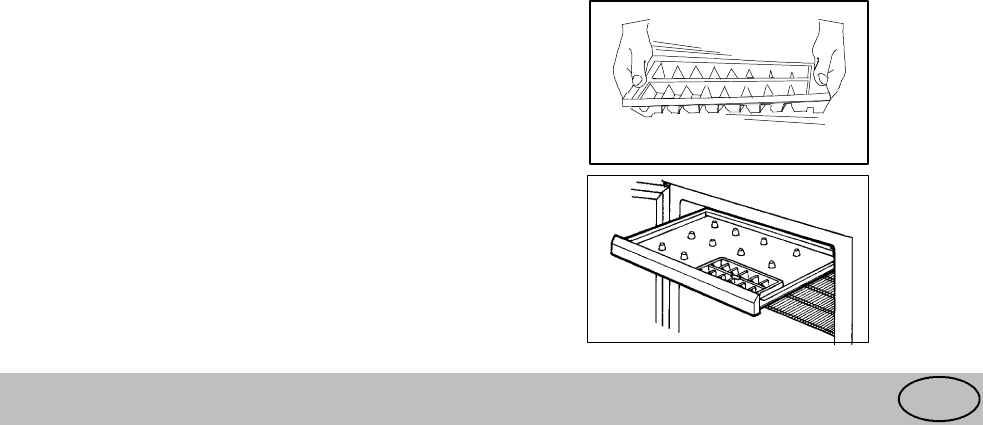
7
Zanussi 818 15 02--03/3
Ice cubes
Fill the ice cupe tray 3/4 full with cold water, place it
in the freezer and leave it to freeze.
To loosen the frozen cubes, either twist the ice cube
tray or hold it under running water for a few
seconds. Important - Never try to free an ice tray
that is frozen to the freezer using pointed or sharp
objects.
Freezer tray
Use the freezer tray to freeze berries and vegetables.
After about 4 hours the food will be thoroughly
frozen and can then be packaged normally. Food
that is frozen in this way will not stick together,
enabling you to use only the amount required.
Hints and Tips
GB
Energy Saving Advice
· Do not install the cabinet close to sources of heat
such as a cooker, dishwasher or radiator.
· Locate the appliance in a cool well ventilated
room and make sure that the air openings of the
cabinet are not obstructed.
· Always leave warm food to cool down to room
temperature before placing in the fridge.
· Try to avoid keeping the door open for long
periods, or opening the door too frequently as
warm air will enter the cabinet, and cause the
compressor to switch on unnecessarily often.
· Ensure there are no obstructions preventing the
door from closing properly.
· It is advisable to periodically clean the
refrigeration system at the back of the appliance
with a duster or vacuum cleaner.
· Avoid unnecessary frosting in the cabinet by
packing all foodstuffs into airtight packages
before placing them in the freezer.
· Carefully follow the advice on freezing products
in the section "Use". This will prevent wasting
energy.
· Do not set the temperature too low in the freezer.
A suitable temperature is in the range of -18°C
to -20°C .
· Defrost the freezer when the frost layer reaches a
thickness of 3-5 mm. Regularly check the door
seal to ensure that it is clean and free from debris.
· Make sure the door gasket is complete and
always clean.
Food Storage
· Avoid buying frozen food if you can not store it
straight away. The use of an insulated container is
advisable. When you arrive home place the
frozen food in the freezer immerdiately.
· Ensure that food placed in the freezer is dated
and labelled and used in date order to ensure that
food is consumed at its best.
Remove suspect food from you refrigerator and
clean, refer to cleaning and maintenance.
· In the event of a power failure causing the
temperature within your freezer to rise, do not
refreeze the food without checking its condition.
The following guidelines should assist you.
Ice-cream: once thawed should be discarded.
Fruits & Vegetables: if soft should be cooked and
used up.
Breads & Cakes: can be re-frozen without danger.
Shellfish: should be refrigerated and used up
quickly.
Cooked Dishes: i.e. casseroles should be
refrigerated and used up
Large Pieces of Meat: can be re-frozen providing
there are still ice crystals remaining within them.
Small Joints: should be cooked and can then be
refrozen as cooked dishes.
Chicken: should also be cooked and re-frozen as a
cooked dish.
Normal Operating Sounds
· You may hear faint gurgling or bubbling sounds
when the refrigerant is pumped through the coils
or tubing at the rear, to the cooling
plate/evaporator.
· When the compressor is on, the refrigerant is
being pumped round, and you will hear a
whirring sound or pulsating noise from the
compressor.
· A thermostat controls the compressor and you
will hear a faint " click" when the termostat cuts
in and out.


















